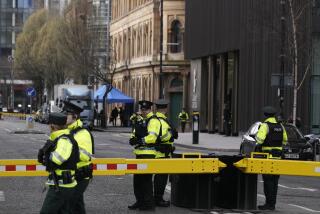N. Ireland Peace a U.S. Priority, Gore Says
- Share via
BELFAST, Northern Ireland — Vice President Al Gore declared Wednesday that the Northern Ireland peace process currently under way is “right at the top” of the U.S. foreign policy agenda.
The vice president met Irish Prime Minister Albert Reynolds at Shannon Airport in Ireland during a refueling stop on his way back to Washington from a world population conference in Cairo.
After a briefing from Reynolds on the state of the cease-fire announced a week ago by the Irish Republican Army, Gore said: “The American people have a dream that this peace process will succeed. It is right at the top of our foreign policy agenda.”
He added: “President Bill Clinton and I stand ready, as do all the American people, to support our British and Irish friends in their efforts to achieve peace.
“The President and I commend those who have worked so diligently over the past 25 years to achieve what at times seemed impossible to find--a way to peace.”
Gore declared that the United States wants to help both Protestant and Roman Catholic communities in Northern Ireland in the search for a lasting solution to the long-running sectarian violence.
“Each side stands only to lose by further violence,” he said. “Both can gain the promise of a better, more prosperous future for their children through a just and lasting peace.”
The two leaders met less than 24 hours after Reynolds held a first-ever conference with Irish Republican leader Gerry Adams, head of Sinn Fein, the IRA’s political arm.
Gore and Reynolds discussed how the United States could further support the drive for peace amid speculation that an aid package of about $130 million will be made available by Washington.
For his part, Reynolds praised the “sustained and crucial support given by the U.S. Administration to the process of peace and the development of an agreed political settlement.”
He added: “The government here attaches great importance to the continuing support of President Clinton and his Administration in advancing the process. They have played a very, very significant role in bringing us to the present position. They have encouraged others to turn away from violence for good.”
Gore said that whether the unionists, who advocate continued British rule in Northern Ireland, will join Reynolds’ planned National Forum for Peace and Reconciliation is a matter for them to decide but that he would encourage everyone to take part.
Meanwhile, British Northern Ireland Secretary Patrick Mayhew said Wednesday that security levels in the province have been scaled down since the cease-fire went into effect.
Though British Prime Minister John Major on Wednesday continued to press for Sinn Fein to issue a “clear-cut, unequivocal” declaration renouncing violence, Mayhew disclosed that police and military forces in Northern Ireland have reduced security precautions.
Mayhew said soldiers were patrolling in Northern Ireland wearing berets instead of hard helmets. In parts of Belfast on Wednesday, there were no soldiers to be seen on patrol. Some checkpoints had been removed from roads leading into the province.
The Rev. Ian Paisley, the militant unionist leader, came under criticism from other unionists in Belfast on Wednesday for his performance in a meeting with Major on Tuesday evening. Major dismissed Paisley because he would not accept the prime minister’s word that Northern Ireland Protestants’ constitutional rights will be protected in any peace accord.
William Ross, a leading member of the official Ulster Unionist Party, said he would take a “very dim view” of joining a unionist forum organized by Paisley, who heads the Democratic Unionist Party.
“Many members of the party are outraged,” Ross said. “Ian Paisley clearly set out with the sole purpose of having a confrontation. This is not what unionism needs at this time.”
More to Read
Get the L.A. Times Politics newsletter
Deeply reported insights into legislation, politics and policy from Sacramento, Washington and beyond. In your inbox twice per week.
You may occasionally receive promotional content from the Los Angeles Times.










